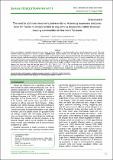The need to optimize deworming interventions: Assessing awareness and p rac- tices for Taenia multiceps control in dog - owning households within livestock - keeping c ommunities in Northern Tanzania

View/
Date
2025-05-04Author
Kibona, Tito
Buza, Joram
Shirima, Gabriel
Metadata
Show full item recordAbstract
Taenia spp infections, especially cerebral coenurosis caused by Taenia multiceps, pose serious health risks to both livestock and humans. This study examines deworming practices in northern Tanzania, highlighting the disparity between those for dogs and small ruminants amid high coenurosis incidences in small ruminants and undocumented human cases. A cross-sectional survey was conducted with 252 dog-owning households, 248 of which also kept livestock, randomly selected from 18 villages representing pastoral and agro-pastoral communities. The results revealed that only 15% of dog owners dewormed their animals, compared to 85% of small ruminant farmers. Awareness of deworming medications for dogs revealed that only 24% of respondents able to identify suitable dewormers for dogs. The median time since the last deworming in dogs was reported as 14 weeks (range: 0 to 100 weeks). Households aware of appropriate dewormers for treating and controlling helminths in dogs were over twenty-eight times more likely to deworm their dogs than those not aware (OR = 28.1, 95% CI 11.0 – 79.10). The intervention model projected that increasing the dog deworming rate to 85% could significantly reduce T. multiceps transmission. This study highlights a critical gap in dog deworming practices and emphasizes the urgent need for better education on anthelmintics and improved access to appropriate dog helminth preventive treatments, which could significantly enhance small ruminant productivity and public health outcomes in resource-limited rural areas.
